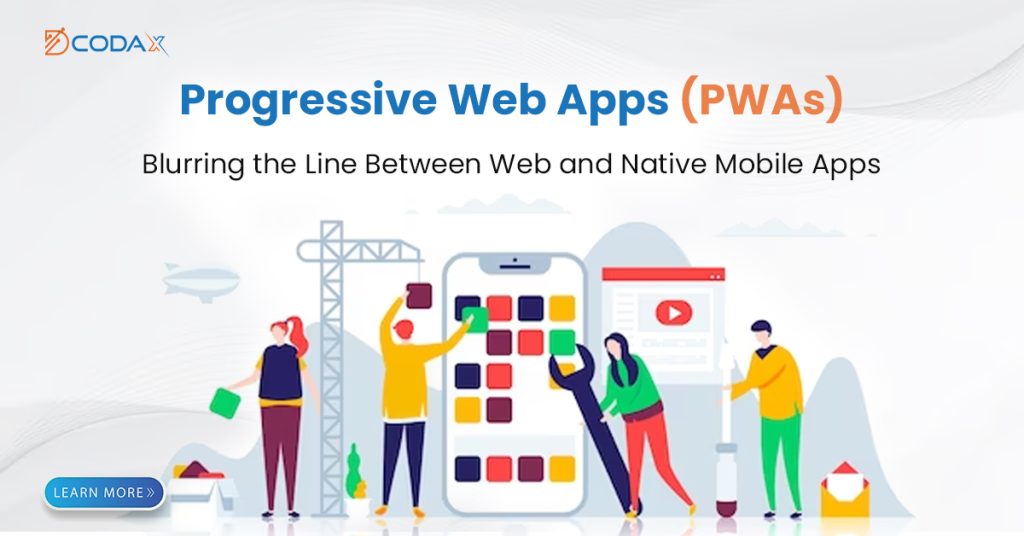Progressive Web Apps (PWAs): Blurring the Line Between Web and Native Mobile Apps

In the ever-evolving landscape of mobile app development, there exists a groundbreaking innovation that is blurring the line between web and native mobile applications. Enter Progressive Web Apps (PWAs), the embodiment of technological expertise and versatility. With PWAs, the limitations of traditional apps are shattered, giving rise to a new era of seamless user experiences and unparalleled cross-platform compatibility. It’s a revolution that harnesses the power of web technologies to deliver an app-like encounter, forever changing the way we interact with mobile applications.
Within the realm of PWAs lies a world of advantages that transcend the boundaries of conventional apps. These advantages include:
⦁ Offline Capabilities: PWAs have the extraordinary ability to function flawlessly even in the absence of an internet connection. Users can remain engaged and connected, regardless of connectivity challenges.
⦁ Push Notifications: Businesses can now forge real-time connections with their audience through the power of push notifications. Personalized updates and valuable content can be delivered directly to users’ devices, ensuring they stay engaged and informed.
⦁ Cross-Platform Compatibility: PWAs liberate developers from the constraints of platform-specific development. They transcend the limitations of operating systems, offering a uniform and consistent experience across various devices and browsers.
⦁ Enhanced Performance: Speed and efficiency are at the core of PWAs. They employ ingenious techniques to optimize performance, resulting in lightning-fast loading times and fluid interactions that captivate users from the moment they engage.
With these remarkable advancements, PWAs redefine the boundaries of mobile app development, providing businesses and users with endless possibilities. It’s a journey into the realm of innovation and ingenuity, where the line between web and native apps blurs, ushering in a new era of mobile experiences that captivate and inspire. Welcome to the world of Progressive Web Apps, where the future of mobile app development is now.
Understanding Progressive Web Apps

Before we dive into the benefits of PWAs, let’s first understand what they are. Progressive Web Apps are web applications that leverage modern web capabilities to deliver an app-like experience to users. They are built using standard web technologies such as HTML, CSS, and JavaScript but provide an immersive user experience similar to that of native mobile apps.
Unlike traditional web apps, PWAs can be accessed directly from the user’s home screen, just like native apps. They are also capable of working offline or with a poor internet connection, thanks to the use of service workers and caching mechanisms. This offline functionality sets them apart from regular websites and enables users to continue using the app even when they’re not connected to the internet.
Advantages of Progressive Web Apps

Offline Capabilities:
One of the most significant advantages of PWAs is their ability to function offline. By utilizing service workers, PWAs can cache app resources, including HTML, CSS, and JavaScript files, to provide offline access to users. This means that even in areas with limited or no internet connectivity, users can still access and interact with the app. Offline capabilities enhance user experience and make PWAs a reliable choice for businesses.
Push Notifications:
Another compelling feature of PWAs is the ability to send push notifications, similar to native mobile apps. Push notifications allow businesses to engage with users by delivering real-time updates, announcements, and personalized content. This feature is highly effective for marketing campaigns, user retention, and driving user engagement. By integrating push notifications, PWAs can provide a seamless and interactive experience to users.
Cross-Platform Compatibility:
Cross-platform compatibility is a key advantage of PWAs. Unlike native apps that require separate development efforts for different platforms (such as iOS and Android), PWAs can be accessed on any device with a modern web browser. This eliminates the need for platform-specific development and reduces the time and cost associated with building and maintaining separate apps for different platforms. PWAs are responsive and adaptive, ensuring a consistent user experience across devices.
Improved Performance:
PWAs are designed to offer fast and responsive user experiences. By utilizing techniques like caching, lazy loading, and optimized resource loading, PWAs can deliver quick and seamless interactions to users. They load instantly, even on slow or unreliable networks, which significantly improves user satisfaction and reduces bounce rates. With their focus on performance, PWAs provide a competitive edge in the mobile app landscape.
Discoverability and Shareability:
Since PWAs are essentially web applications, they can be easily discovered and shared. Unlike native apps that require installation from app stores, PWAs can be accessed directly via URLs. This makes them more accessible and eliminates the barrier to entry associated with traditional app installation. Users can share PWAs with others simply by sharing the app’s URL, making it easier for businesses to reach and engage a wider audience.
Cost-Effectiveness and Simplified Maintenance:
Developing and maintaining separate native apps for different platforms can be time-consuming and expensive. PWAs offer a cost-effective alternative by allowing businesses to build a single app that works across platforms. This reduces development and maintenance costs, as updates and bug fixes can be rolled out simultaneously for all users. The simplified maintenance process and reduced time-to-market make PWAs an attractive choice for businesses.
Disadvantages of Progressive Web Apps

While Progressive Web Apps (PWAs) offer numerous advantages, it’s important to consider their potential disadvantages as well. Here are some challenges and drawbacks associated with PWAs:
Limited Native Functionality:
PWAs are built using web technologies and rely on web APIs, which may have limitations compared to the native capabilities of specific platforms. While many features can be replicated in a PWA, there may be certain functionalities that cannot be fully achieved or may require workarounds. Native apps still have an edge in terms of accessing device-specific features like sensors, cameras, and advanced hardware integration.
Browser Dependency:
PWAs rely on web browsers to function. While modern browsers generally support PWA technologies, there may be inconsistencies or variations in how different browsers interpret and handle certain features. This can lead to inconsistencies in user experience across various browsers and devices. Developers need to thoroughly test and ensure cross-browser compatibility for a seamless experience.
Limited App Store Exposure:
Unlike native apps, PWAs are not typically distributed through traditional app stores. While some app stores may allow PWAs to be listed, the visibility and discoverability of PWAs in these stores are often limited. This can make it challenging for businesses to reach a wider audience and gain traction, as users are accustomed to searching for apps within the app store ecosystem.
Dependency on Network Connection:
Although PWAs can work offline or with a poor internet connection to a certain extent, their functionality is still limited without a stable network connection. While certain resources and content can be cached for offline access, real-time data or features that require constant connectivity may not be available. Users may experience limitations in functionality or delays in accessing up-to-date information when using PWAs offline.
Limited Access to Device Capabilities:
As PWAs operate within the web browser environment, they may have restricted access to certain device capabilities. Features like background processes, device storage, and system-level integrations may not be available or may have limited functionality. This can be a challenge when developing complex applications that require deep integration with device-specific features.
User Awareness and Adoption:
While PWAs have gained recognition and popularity, there is still a level of awareness and adoption required among users. Many users may not be familiar with the concept of PWAs or may not understand the benefits they offer. Educating users about the advantages of PWAs and encouraging them to add the app to their home screen may require additional effort from businesses.
App Size and Performance Trade-offs:
In some cases, PWAs may have larger file sizes compared to native apps due to the inclusion of web frameworks and libraries. This can impact the initial loading time, especially on slower network connections. While efforts can be made to optimize performance, striking a balance between app size and performance can be a challenge for developers.
Examples of Successful Progressive Web Apps

Twitter Lite
Twitter Lite is a prime example of a successful PWA. It offers a lightweight, fast, and data-efficient alternative to the native Twitter app. With its offline capabilities, push notifications, and streamlined user experience, Twitter Lite has garnered widespread adoption, particularly in regions with limited internet connectivity.
Starbucks
Starbucks developed a PWA that enables users to order drinks and food, locate stores, and earn rewards. The PWA offers a seamless experience, even in areas with poor network conditions. It allows users to browse menus, customize orders, and complete transactions, all within a single app-like interface.
Flipboard, a popular news aggregation platform, adopted a PWA strategy to provide a consistent experience across devices. The PWA offers fast content loading, offline reading, and a smooth browsing experience. By leveraging the advantages of PWAs, Flipboard has improved user engagement and expanded its user base.
Pinterest, a popular platform for discovering and saving ideas, adopted a PWA strategy to enhance the user experience across devices. Their PWA allows users to browse and save pins, access personalized recommendations, and engage with content seamlessly. The PWA offers fast loading times and offline capabilities, ensuring users can continue discovering inspiration even without an internet connection.
Uber
Uber, the renowned ride-hailing service, leveraged the power of PWAs to provide an accessible and reliable experience for users. Their PWA enables users to book rides, track drivers, and view trip details, all within a fast and streamlined interface. The PWA’s ability to work offline and deliver real-time updates ensures a seamless experience even in areas with limited network connectivity.
Wrapping it up
Progressive Web Apps are revolutionizing the mobile app development landscape by blurring the line between web and native mobile apps. With their offline capabilities, push notifications and cross-platform compatibility, PWAs offer numerous advantages for businesses and users alike. They provide an app-like experience directly from the web browser, eliminating the need for installation. The ability to function offline, send push notifications, and offer improved performance makes PWAs a compelling choice for modern app development. As the technology continues to evolve, PWAs are poised to shape the future of mobile applications, providing a seamless and accessible experience to users around the globe.
About us:
In the fast-paced world of App Development, businesses must stay updated on the top features of app development in 2023 as this can help to grow your audience. Selecting the right App Development company is essential to ensure your project’s success. At Dcodax, our Top App Developers have a finger on the pulse of the industry, staying up-to-date with the latest trends and technologies to help you choose the best platform for your needs. Whether you’re looking to hire App Developers or seeking expert guidance, trust us to deliver exceptional results.
With Dcodax by your side, the sky’s the limit!
For Any Type of Free Consultancy, Dcodax is Always Available for your Help.
For more; Contact Us Now





